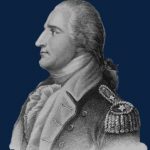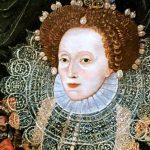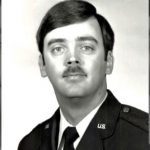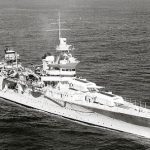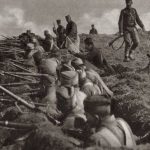 History
History  History
History  Health
Health 10 Everyday Activities That Secretly Alter Consciousness
 History
History Top 10 Historical Disasters Caused by Someone Calling in Sick
 Animals
Animals 10 New Shark Secrets That Recently Dropped
 Movies and TV
Movies and TV 10 Forgotten Realities of Early Live Television Broadcasts
 Technology
Technology 10 Stopgap Technologies That Became Industry Standards
 Weird Stuff
Weird Stuff 10 Wild Facts About Taxidermy That You Probably Didn’t Know
 Travel
Travel 10 Beautiful Travel Destinations (That Will Kill You)
 Miscellaneous
Miscellaneous 10 Modern Marriage Rituals Born from Corporate Branding
 Weird Stuff
Weird Stuff Ten Bizarre Visions of 2026 from Fiction
 History
History 10 “Modern” Problems with Surprising Historical Analogs
 Health
Health 10 Everyday Activities That Secretly Alter Consciousness
 History
History Top 10 Historical Disasters Caused by Someone Calling in Sick
Who's Behind Listverse?

Jamie Frater
Head Editor
Jamie founded Listverse due to an insatiable desire to share fascinating, obscure, and bizarre facts. He has been a guest speaker on numerous national radio and television stations and is a five time published author.
More About Us Animals
Animals 10 New Shark Secrets That Recently Dropped
 Movies and TV
Movies and TV 10 Forgotten Realities of Early Live Television Broadcasts
 Technology
Technology 10 Stopgap Technologies That Became Industry Standards
 Weird Stuff
Weird Stuff 10 Wild Facts About Taxidermy That You Probably Didn’t Know
 Travel
Travel 10 Beautiful Travel Destinations (That Will Kill You)
 Miscellaneous
Miscellaneous 10 Modern Marriage Rituals Born from Corporate Branding
 Weird Stuff
Weird Stuff Ten Bizarre Visions of 2026 from Fiction
10 Facts about the Last Man to Be Hanged for Treason in the UK
Britain’s treason legislation dates back to the Treason Act of 1351, and bizarrely, it remains on the statute books to this day. Notables who were found guilty of treachery include Guy Fawkes, who plotted to blow up the Houses of Parliament in 1605. Another was Oliver Cromwell, who was found guilty of treason three years after his natural-cause death for the beheading of Charles I. In a macabre twist, Royalists dug up his body in 1661 so it could be publically hanged.
However, the last man to be executed as a traitor was William Joyce. He earned notoriety during World War II under the nickname of “Lord Haw Haw” and was regarded by the Nazis as a vital weapon of war. They used him to broadcast demoralizing propaganda via radio shows beamed to Britain. As we’ll see, the Germans were barking up the wrong tree. In fact, many British people regarded him as a comic figure, although that did not help Joyce avoid his gruesome fate.
Related: Ten Tales from the Last U.S. Ship Sunk in World War II
10 Born in Brooklyn
William Brooke Joyce was born in the Bedford–Stuyvesant district of Brooklyn, New York, in 1906. His father, Michael, had gained U.S. citizenship in 1894, so the infant Joyce was born an American. However, as we’ll see, he later claimed British and then German citizenship. Joyce’s time in the U.S. was brief since his father and his mother, Gertrude, moved back to their homeland of Ireland when their son was just three.
Michael Joyce was a committed supporter of British rule in Ireland, and William inherited his father’s political beliefs. When he was still a lad of just 14, he was recruited by the British intelligence service in Ireland as a courier. There were whispers that Joyce was involved in the murder by security forces of an Irish patriot, Father Michael Griffin, although this was never conclusively proven.[1]
9 Fascism Beckons
Joyce left Ireland in 1921, crossing the Irish Sea to settle in London, where he enrolled at Birkbeck College, which was part of the University of London. There, he joined the Officers Training Corp, a voluntary military training outfit that acted as a feeder for British forces. To qualify for the OTC, Joyce had to pretend he was a British citizen. His father collaborated in this deceit by claiming he and his son were British. But as we know, Michael had actually gained U.S. citizenship years earlier.
Not long after he’d arrived in London, Joyce showed his political affiliations by joining a far-right political party, the British Fascists, It was during this period that Joyce’s face was slashed in a street fight with communists. Photographs of him show the livid scar running right across his cheek from his ear to his mouth.[2]
8 Fanatical Anti-Semitism
But his political activities didn’t stop him from success in his studies at Birkbeck, graduating as he did with a first-class honors degree in English in 1927. In the same year, he married Hazel Kathleen Barr, and the couple had two daughters, although the marriage ended in 1936. According to the Dictionary of Irish Biography, the divorce came thanks to Joyce’s “infidelities, heavy drinking, and temper.”
Joyce began to get really serious about politics in 1932 when he joined the British Union of Fascists (BFU), founded and led by the notorious Nazi sympathizer Sir Oswald Mosley. Joyce soon gained a reputation as a gifted speaker and, in 1934, was appointed to the full-time position of BFU director of propaganda. Moseley apparently appreciated his talents, and Joyce became the BFU’s deputy leader. But Joyce and Mosley became increasingly at odds. Joyce felt that his leader was not radical enough and not sufficiently anti-Semitic.[3]
7 The National Socialist League
Although Joyce called Mosley “the greatest Englishman I have ever known,” privately, he said that “Mosley was hopeless. He was the worst leader of what should have been the best cause in the world.” Eventually, perhaps hearing gossip about Joyce’s view of him, in 1937, Mosley fired his deputy. Joyce’s response was to form his own party, the National Socialist League (NSL).
The NSL’s ardent admiration for Hitler and its hatred of Jews attracted few recruits, at most about 50. The year 1937 also saw Joyce’s second marriage, his new bride, a fellow fascist called Margaret Cairns White. Joyce now made a living as a private tutor, although he made sure to refuse potential students if they were Jewish.[4]
6 Lord Haw Haw Is Born
The key turning point in Joyce’s life came in 1939 after he renewed the British passport he’d fraudulently obtained in 1933 by claiming to be Irish by birth. Of course, he’d really been born in the U.S. With his new travel document, Joyce and Margaret traveled to Germany in August, just weeks before WWII broke out. The couple arrived in Berlin with no prospects, but a lucky break soon came.
Joyce managed to get a job as an announcer on the English service of the Nazi state radio station, the Reichsrundfunk. His broadcasts were heard in England along with the voices of other English speakers, several of whom were given the epithet “Lord Haw-Haw.” But it was Joyce’s notorious bulletins that gave him sole rights to the nickname.[5]
5 A Sickening Renegade
The National WWII Museum describes Joyce’s radio shows as “snide, mocking, and at times menacing.” Although he “urged the British to surrender and blamed the Jews for the outbreak of the war,” it seems that listeners in Britain mostly regarded him as a figure of fun. Even so, his listener figures were surprisingly large.
There was no law forbidding the British from tuning in to these broadcasts from Germany, and they attracted regular audiences as large as six million, with another 18 million tuning in occasionally. There was much speculation as to the identity of Lord Haw-Haw. In a letter to News Review magazine, a Mr. A.R. Thomas asked, “What can have induced an Englishman, if he is an Englishman, to behave in such a sickening renegade manner?”[6]
4 “Lord Haw Haw the Humbug of Hamburg”
In fact, Joyce thrived under the German fascist regime, and it’s even said that Goebbels, a Nazi propaganda supremo, admired his work. Haw-Haw had become a major media figure in the U.K., so much so that even advertisers got involved in the act. One ad for Smith’s Electric Clocks used the slogan “Don’t risk missing Haw-Haw. Get a clock that shows the right time always, unquestionably.”
British comedians also found a rich vein of material in the bizarre broadcast, which always started with the drawled phrase “Germany calling, Germany Calling.” A production entitled Haw Haw ran for several months in a London theater, and comic duo, the Western Brothers, performed a song titled “Lord Haw Haw the Humbug of Hamburg.” [7]
3 “One of the Best Broadcasters Ever”
However much of a comic figure Joyce might have cut, the BBC certainly took him seriously. It hired criminologist Edgar Lustgarten to broadcast rebuttals of Joyce’s broadcasts to America and Canada, which also received the Nazi radio shows. In a chilling instance of anti-Semitism, the BBC told Lustgarten to broadcast under the name Brent Wood to disguise his Jewish heritage.
Obviously, Lustgarten was entirely opposed to Joyce’s poisonous propaganda. But he recognized the man’s mastery of the dark arts of deceit and disinformation, dubbing him “one of the best broadcasters ever.” Lustgarten also said, “He had that sort of compulsion that you had to go on listening to him whether you liked what he was saying or not.”[8]
2 The Last Broadcast
As the tide of the war began to flow ever-faster in favor of the Allies, Joyce’s broadcasts became increasingly less triumphal. They began to focus on the threat from the Soviet Red Army, which was marching toward Berlin. He made his last broadcast on the very day that his hero, Adolf Hitler, ended his own life in the Führerbunker in Berlin on April 30, 1945.
Joyce had already fled Berlin in March 1945 and made that final broadcast from Hamburg. In May, some three weeks after Germany surrendered, Joyce was captured by the British as he gathered firewood near a village called Kuffermuille in northern Germany. During his arrest, he was shot in the buttocks when he reached for his back pocket. He’d actually been about to produce a fake passport and wasn’t, in fact, armed.[9]
1 A Hanging
Margaret was also arrested soon after her husband was captured, but she never faced any charges. However, she, like Joyce, had taken German citizenship. The BBC tells us, “She drank herself to death in London in 1972.” Joyce was charged with high treason and tried in September 1946. There was some question about the charges against him since he had not been a legitimate British citizen, having lied about his American roots when he got a U.K. passport by claiming Irish birth.
But that detail was soon swept aside. Joyce was found guilty and was sentenced to death. His appeals against the verdict failed, and in January 1947, he was hanged at Wandsworth Prison in south London. He was the last man to be executed for treason in Britain.[10]
